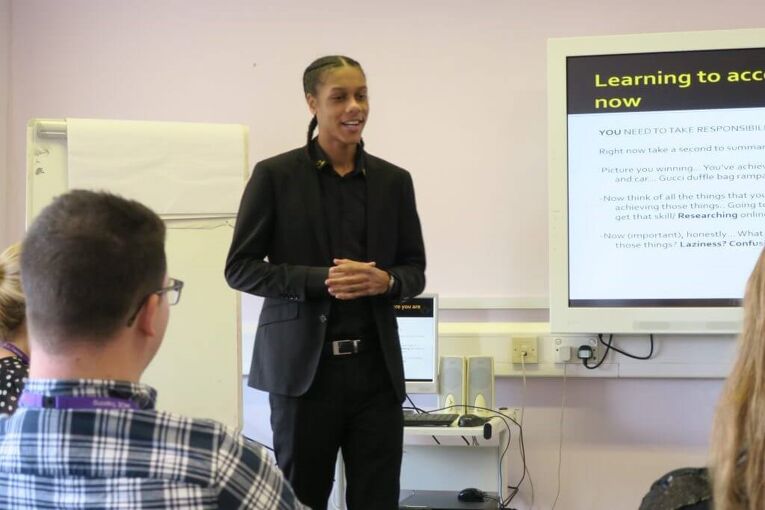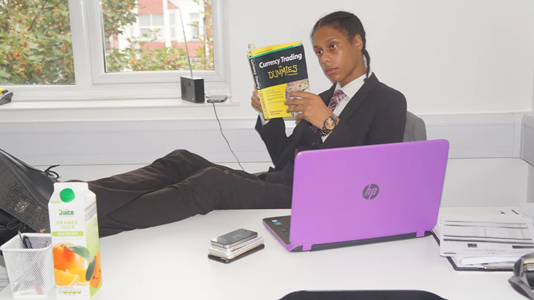Insights
Whilst they follow you around, stay focused on following your dreams

By Tyrell Davis-Douglin
Tyrell, 20, is one of ten Londoners who have been recruited to form the London VRU’s Young People’s Action Group. The Group has a remit to ensure that the voice of young people is reflected in the VRU’s work, and that young people are given the opportunity to lead change.Read about our latest campaign against violent crime, Silence Won’t Stop Violence, and how to speak up to help save lives
Attempts to prevent crime are all around us. As soon as I step out, I’m caught on one of the estimated 600,000-700,000 surveillance cameras installed across London. If I go into a shop, I’m followed by a security guard who is misguided in his belief that him making his presence known will deter me from committing a crime I had no intention of committing. On my way home, I might be subjected to one of the 900 stop and searches the Metropolitan Police conducts in London every day, 78% of which result in no action being taken against the person whose liberties have been wrongly interrupted.
Crime, violent crime especially, is a real concern for young Londoners like me. However, whilst young people – especially those of us from poor and ethnic minority backgrounds – might be viewed by police, retailers, and the media as a threat to public safety, I believe we’re actually part of the solution.
Doubling or even tripling the number of cameras or police or security guards is not the most effective way to reduce violence in London. I believe that understanding the causes of violence, and working to address those is far more effective. Rather than stigmatising and stereotyping us, listening to young people is a much better starting point…
Living life in 2-D
The way I see it, a lot of young people live in 2-D. We’re all born as blank canvases. From that point on, everything we do is either learnt by, imposed on, or adopted by us. I have noticed that young people where I grew up have had our social identities handed down to us. The level of our aspirations has been capped. Stigmas are attached to us without any relation to who we really are as individuals. This is a damaging start for the mentality of our generation.Rather than seeing young people as a menace to society, what if we are seen as future leaders with goals that need encouraging, ideas that need fuelling, and growing pains that need understanding?
What if we opened young people’s minds to believe that the limited 2-D world we are born into is not the world we have to die in? What if we opened up a third dimension to a young person’s perspectives full of possibilities by investing in our futures?
The power is in our hands to do this. The Mayor of London’s Violence Reduction Unit is taking this approach, and I’m one of ten young people from around London who are working with them to change the narrative around young people, advocate for young Londoners’ needs, and provide positive opportunities and environments for people like me to choose a progressive path in life.
Adjusting mindsets of young people
It’s important that every young person can genuinely identify what they want from life, and then get the relevant support to get themselves there. Whilst part of this requires investment in education, training, youth services, and better living conditions, part of this also requires the individual to show initiative themselves. The same internet you use to stream Netflix or play on the PlayStation is the same internet you can use teach yourself how to set up a business or connect with people who can help build your dreams.
Schooling should be as much about nurturing a creative, ambitious, curious mindset as it as about passing exams. We need to believe in ourselves, but we also need society to believe in us and to back that up with tangible ways of supporting young people in entrepreneurship, training, well-paid jobs, and decent housing. Without this, where is the incentive? Approaches designed to deter wrong-doing will always fail if the incentives to do right are weak.
Young people want an equal opportunity to achieve as there is an equal opportunity to offend. The lure of drugs, violence, and quick money will always be there. But so are the risks. However, if young people like me are excluded from genuine opportunities to live a prosperous progressive life, the lure of getting involved in behaviour that can lead to violence and criminality is strengthened. It’s not excusing criminality to say that people often do what they feel they need to do to survive. It’s the reality of many young people’s lives.
The power of peers
Young people have a role to play in influencing other young people to turn away from crime, violence, and drugs. How many times does a young man’s mother tell him that he needs to take responsibility for his life, but he doesn’t take heed of it? I teach a course to people my age, in which I boldly reinforce this. However, coming from someone who looks, dresses, and talks like them, I’ve found it to be more effective when communicating a similar message.Age is no barrier to being a positive role model to a young person. Of course, there’s a level of success that usually comes with age. Often young people’s minds are impressed by materialistic possessions – the clothes someone wears, the car they drive, or house they live in. So, if they are seeing someone who has these things, they are more likely to pay attention to them. Social media exposes young people to lavish lifestyles that they then desire for themselves, and these platforms can even connect them to people promising access to such lifestyles through criminal means.
A young person might find themselves at the point where they’re going to make a decision that could have life-changing effects for them and others. At that point, it’s a harder job to try to influence someone out of doing something.
The question I’d ask any young person is, what do you want for your future, and have you considered that the consequences of your actions today may prevent you from achieving that future tomorrow? Society may have set you up to fail, but do you have to take the bait?
I made a covenant with myself to live to defy the stereotypes against me. But that change had to come from within. I taught myself law, I started to volunteer, and I taught myself to play the piano. Seeing people’s reaction to me still in my hoodie but playing the piano reveals a lot about what other people expect of someone like me.
It’s these attitudes and stereotypes that make spaces and activities that should be open to all – such as theatres, galleries, nice restaurants – sometimes feel like hostile places to people like me, limiting us to that 2-D world I spoke of earlier. But we young people are also guilty of doing this to each other. If you’re in school and your friend wants to learn the violin, or take up badminton, or go to the theatre, we should encourage them, rather than laugh at them and strip them of the confidence to explore something new. We all have the right to explore the things in life that we want to. We all have the right to dream.
From this year onwards, 7 December will be known as the Day of Hope. It should have been the day Damilola Taylor celebrates his birthday. I’ll be spending that day teaching a course to young people to help them identify their own hopes and dreams. But having opened young minds to think positively in 3-D, we then need to be provided with the tangible guidance, support, spaces designed for young people, funding, role models, and mentorship to enable us to flourish. This is the most effective way to supress violence in London.
I know this because it’s worked for this kid from South Norwood, who made it his business to inspire other young people.
Now, if I’m followed around a shop, my mentality is not to be aggravated. Security can follow me all he wants. Whilst he’s wasting his time following me, I’m investing my time in following my dreams.
_______________________________
Follow the London VRU on Twitter, and follow me on LinkedIn, Instagram, or through my website:
Find out more about our youth service Fearless, and its role in reporting and preventing crime
Read about our latest campaign against violent crime, Silence Won’t Stop Violence, and how to speak up to help save lives